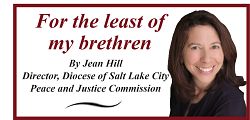Proposed Federal Budget Pulls the Ladder from Under Struggling Families
The Catholic Church has long held that budgets are moral documents. The priorities we set in our economic decisions, whether as individuals, households or governments, reveal what we value.
Because budgets are moral documents, many advocates of the low-income population are strongly opposed to the proposed federal budget recently released by the administration. Based on the policy decisions and cuts represented in the proposal, there is much work to do to ensure low-income working families, among others, are not harmed by their government.
Consider, for example, proposed changes to several programs that make it possible to put food on the table for 45.4 million people. The budget proposes cutting the Supplemental Nutrition Assistance Program by 25 percent ($193 billion over 10 years). One stated goal of the cuts is to get people to work. But in Utah, 56 percent of Utahns receiving SNAP benefits (once known as food stamps) work. To actually increase the work ability of people who receive these benefits, budget policies that provide options for more job training, provisions that render college affordable, and improved access to affordable, quality child care for working parents would go much further than eliminating the $1.41 per meal per day that a SNAP recipient might receive in food assistance.
Also missing from the proposal is a clear understanding of how family budgets work and the impact of how cuts in one area may affect other areas. For example, when families lose money for food purchases, they may have to move money from another area of their budget. This may mean that a family foregoes filling a prescription or paying a utility bill to make ends meet. These are small acts, but the consequences might be that a chronic illness worsens, requiring more expensive medical care because preventative measures were not taken, or a utility bill grows due to late fees, rendering it even more difficult to pay the next month and beyond.
Moving out of poverty is not as easy as “getting a job.”. Working a full-time minimum wage job in Utah will not provide enough income for a family to pay rent in any county in the state. In the poorest county in Utah, San Juan, a person must make at least $12.65 per hour to afford the market rate rent of $658 per month. In Salt Lake County, it takes $18.04 per hour to afford the average market rent of $938 per month for a two-bedroom apartment. Federal and state minimum wage rates of $7.25 hour guarantee that a family man or woman will need two jobs just to make the rent. Without federal and state assistance, these same men and women will have too little to feed, clothe, educate, and shelter their kids in a home with such luxuries as heat, electricity and water service.
In keeping with our Gospel call of solidarity with the poor and vulnerable, the Catholic Diocese of Salt Lake City is urging our congressional delegation to consider the impacts of cuts in programs that help people meet basic needs. We support the three principles repeatedly provided by the U.S. Conference of Catholic Bishops to guide budget decisions on the federal (and state) level:
1. Every budget decision should be assessed by whether it protects or threatens human life and dignity.
2. A central moral measure of any budget proposal is how it affects the lives and dignity of “the least of these” (Matthew 25). The needs of those who are hungry and homeless, without work or in poverty should come first.
3. Government and other institutions have a shared responsibility to promote the common good of all, especially ordinary workers and families who struggle to live in dignity in difficult economic times.
Federal and state spending priorities impact a struggling family’s ability to have and keep a roof over their heads, food on the table, and raise healthy, educated kids. While all families must take personal responsibility for their economic future, political institutions play an important role in ensuring that, when the bottom falls out, there is a safe place to land, with a ladder to help people get back up again. The current federal budget proposal pulls the ladder out from under the feet of millions of people trying to get back to a place of economic security, and thus fails to respect the dignity of life.
Jean Hill is the director of the diocesan Peace & Justice Commission.
© Copyright 2024 The Diocese of Salt Lake City. All rights reserved.


Stay Connected With Us